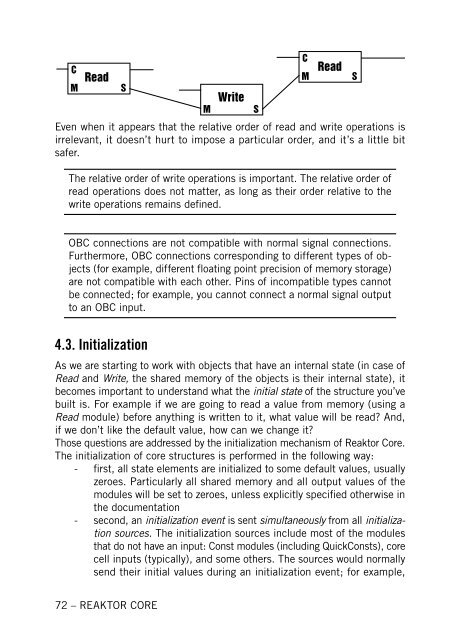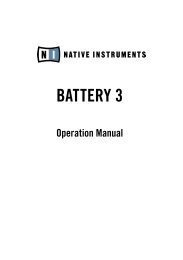1. First steps in Reaktor Core - Native Instruments
1. First steps in Reaktor Core - Native Instruments
1. First steps in Reaktor Core - Native Instruments
You also want an ePaper? Increase the reach of your titles
YUMPU automatically turns print PDFs into web optimized ePapers that Google loves.
�<br />
��<br />
���� �<br />
�� ��<br />
72 – REAKTOR CORE<br />
������<br />
�� ��<br />
��<br />
�����<br />
�� ��<br />
Even when it appears that the relative order of read and write operations is<br />
irrelevant, it doesn’t hurt to impose a particular order, and it’s a little bit<br />
safer.<br />
The relative order of write operations is important. The relative order of<br />
read operations does not matter, as long as their order relative to the<br />
write operations rema<strong>in</strong>s def<strong>in</strong>ed.<br />
OBC connections are not compatible with normal signal connections.<br />
Furthermore, OBC connections correspond<strong>in</strong>g to different types of objects<br />
(for example, different float<strong>in</strong>g po<strong>in</strong>t precision of memory storage)<br />
are not compatible with each other. P<strong>in</strong>s of <strong>in</strong>compatible types cannot<br />
be connected; for example, you cannot connect a normal signal output<br />
to an OBC <strong>in</strong>put.<br />
4.3. Initialization<br />
As we are start<strong>in</strong>g to work with objects that have an <strong>in</strong>ternal state (<strong>in</strong> case of<br />
Read and Write, the shared memory of the objects is their <strong>in</strong>ternal state), it<br />
becomes important to understand what the <strong>in</strong>itial state of the structure you’ve<br />
built is. For example if we are go<strong>in</strong>g to read a value from memory (us<strong>in</strong>g a<br />
Read module) before anyth<strong>in</strong>g is written to it, what value will be read? And,<br />
if we don’t like the default value, how can we change it?<br />
Those questions are addressed by the <strong>in</strong>itialization mechanism of <strong>Reaktor</strong> <strong>Core</strong>.<br />
The <strong>in</strong>itialization of core structures is performed <strong>in</strong> the follow<strong>in</strong>g way:<br />
- first, all state elements are <strong>in</strong>itialized to some default values, usually<br />
zeroes. Particularly all shared memory and all output values of the<br />
modules will be set to zeroes, unless explicitly specified otherwise <strong>in</strong><br />
the documentation<br />
- second, an <strong>in</strong>itialization event is sent simultaneously from all <strong>in</strong>itialization<br />
sources. The <strong>in</strong>itialization sources <strong>in</strong>clude most of the modules<br />
that do not have an <strong>in</strong>put: Const modules (<strong>in</strong>clud<strong>in</strong>g QuickConsts), core<br />
cell <strong>in</strong>puts (typically), and some others. The sources would normally<br />
send their <strong>in</strong>itial values dur<strong>in</strong>g an <strong>in</strong>itialization event; for example,










